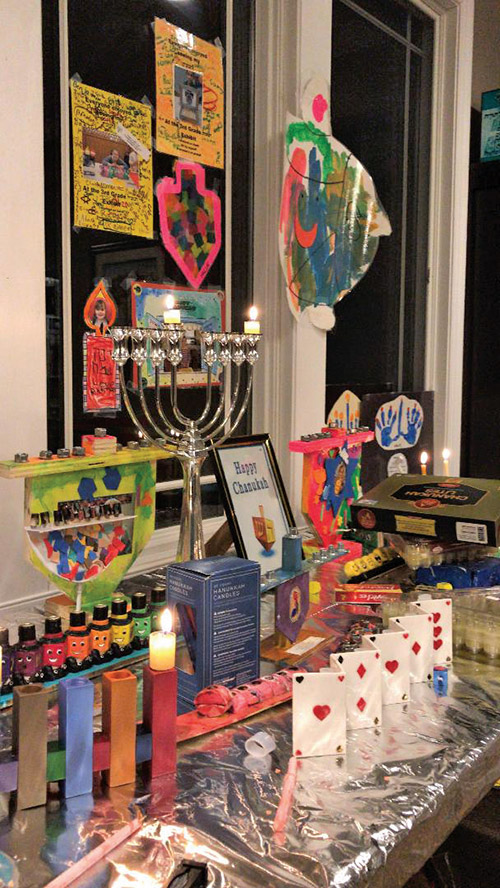

On December 22, families around the world will light the first Chanukah candle. While the holiday of Chanukah has specific laws regarding lighting the menorah, other observances are family traditions that have evolved over generations.
Sisters Erika Gershuni of Teaneck and Cheryl Malina of New Rochelle reminisced about lighting their musical menorah and receiving chocolate gelt.
“Our mother gave us presents each night,” Malina said. “Some were elaborate, others simple, but each night had something surprising, Our father gave us money to choose our own gifts––a bit of both gifts and gelt.”
Gershuni said that she does things a little differently from her parents. “We give our kids gifts. I’m afraid what my kids will choose if we gave them money. I have an idea of what they want, or what I want them to have.” Gershuni also continues their tradition of giving chocolate gelt.
Malina’s new traditions differ a bit from the ones she grew up with as well. “Our strategy has been to give the kids a dollar amount and they go online to shop for their own presents,” she said. “This way, it’s also an activity they can enjoy: choosing items on different websites and catalogues. I also get them some small gifts to open on the first night.”
Gershuni and Malina’s mother, Roza Stern, described what Chanukah was like growing up in Romania, and how much it differs from the common gift-giving and latke-eating we take part in today. “We were lucky if we had potatoes, oil and eggs to make latkes,” Stern said. “At first, we did not have a menorah. We cut potatoes in half and stuck candles in them to create one. The potatoes came from our garden. Once Chanukah ended, we cooked them. We only got a menorah when another family moved to Israel. My father did give us some change, but as my brother said, ‘What toy store was there to buy anything?’
Life was different for her as a parent in America, however. “My kids got presents because everyone else got presents and I didn’t want my kids to feel left out,” she said.
Vera Koppel of New Rochelle is originally from Hungary. Before the war, she received neither gelt nor gifts. Instead, she and her family played dreidel with candy and nuts, watched the menorah and had a nice dinner with latkes. Now, Koppel has incorporated gift-giving into her Chanukah tradition.“My gifts depend on the age of the recipient,” she said. “But (I give) only one gift, not one every night.”
Yael Gorodischer Fraenkel’s parents grew up in Santiago, Chile. When she was an infant, they moved to Israel and later to the United States. She describes their Chanukah celebrations prior to coming to the U.S. as old world. “We lit candles, had fried foods (latkes, sufganiyot), played dreidel and received chocolate gelt coins.” Fraenkel said. “Only after coming here did we find that people gave presents. My brother’s American wife gives presents on Chanukah and I adopted that custom.”
Fraenkel added, “My husband, also an American, thinks gifts are a Christian notion. If presents are going to be given at any time of year, (he thinks) they should be given on Purim. The megillah refers to gifts of food. So it speaks of giving gifts to one another.”
SAR faculty member Jenny Horowitz recalled her memories surrounding Chanukah and gift-giving. “Coming from a big Southern family, we received gifts every night but from different extended relatives. Each of us chose a night to make or buy something for the rest of the family.” she said. “As parents, we give a few gifts the kids really want but also do something special, like crazy latke-making or sufganiyot-making to spend family time together and create memories.”
Michelle Schanzer, of Edison, tries to put an emphasis on family activities. “We specifically do not give any gifts because our kids get gifts all year long, and we feel Chanukah has become very commercialized,” she said. “We light candles, sing songs, dance and get together with our family to light candles. The only exception was when they were younger, we would get all the cousins matching pajamas.”
Ellen Fischel of New Rochelle, recalled how presents for her and her siblings would be piled up in the dining room with their names on them, and there was a sense of mystery about what they would be. “We waited for my father to come home from work to light our menorahs together,” Fischel said. “I have vivid memories of my mom making latkes, and putting them on brown paper bags to soak up the oil.”
Fischel wants to pass along the gift-giving tradition to her children, but with extra meaning. “I want to instill in my kids my memory of lighting the menorah together, and not making the presents the main focus,” she said. “This year, we will incorporate a night of giving gifts to needy kids, to teach being grateful for what we have, and being mindful of those around us who are in need.
Fischel said her family begins getting ready for Chanukah on Rosh Chodesh Kislev. “Our kids take out our Chanukah bin and start decorating the house. We hope to focus on the beauty of the lights and the miracle of the story of Chanukah.”
By Judy Berger
�










